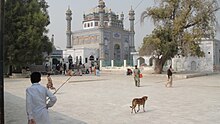Sachal Sarmast - سچل سرمست
Urdu Documentary by Such TV.
Sachal Sarmast (1739–1829) (Sindhi: سچلُ سرمستُ, Urdu: سچل سرمست) was a Sufi poet from Sindh, Pakistan.
He wrote poetry in 7 languages, most prominently in Sindhi, during the Kalhoro/Talpur era of Sindh. He was born inDaraza, near Ranipur, Sindh. His real name was Abdul Wahab Farouqi; he was also nicknamed "Sachal" or "Sachoo". He used this pen-name in his poetry: Sachu means 'truthful' - while in Sindhi Sarmast means 'ecstatic' in Sindhi and Urdu alike. Sachal Sarmast literally means 'truthful mystic' or can be translated as "Ecstatic Saint of Truth".
Sachal's father died when he was a child. He was later raised by his uncle, Pir Khawaja Abdul Haq I, who also became his spiritual master. He married his uncle's daughter, but the young woman died two years later. He never remarried. It is said that he never left Daraza, which was state by then.
Sachal's poetical works are sung by local singers in Sindhi and Saraiki; his shrine is in the village Daraza, near Ranipur,Khairpur District, Sindh, Pakistan.


Life Sketch of Hazrat Sachal Sarmast in Sindhi standing at the entrance of Shrine
Sachal Sarmast was an ardent follower of Wahdat-ul-Wujood (unity of existence), an Islamic Philosophy synonymous with Hamah Oost (all from One). Sachal says (translation by Gul Agha):
Biography
The first compendium of Sachal's poetry was by Agha Sufi. First published in 1933 in Shikarpur, Sindh, it included Sachal's biography and a critical analysis of his philosophy and poetry. The introductory chapters provide a comparative analysis of the poetry of Shah Abdul Latif Bhittai and Sachal Sarmast, an introduction to Sufism andVedanta (Chapter I), a biography of Sachal (Chapter II), and an explanation of the melodic modes or Raga (called "Sura" in Sindhi) that are used in Sachal's poetry (Chapter III).[3] This is followed by a collection of Sachal's poems (Chapter IV) and a glossary and interpretation (Chapter V).
Sachal Sarmast - سچل سرمست
 Reviewed by Uncle Sam
on
00:25
Rating:
Reviewed by Uncle Sam
on
00:25
Rating:
 Reviewed by Uncle Sam
on
00:25
Rating:
Reviewed by Uncle Sam
on
00:25
Rating:











No comments: